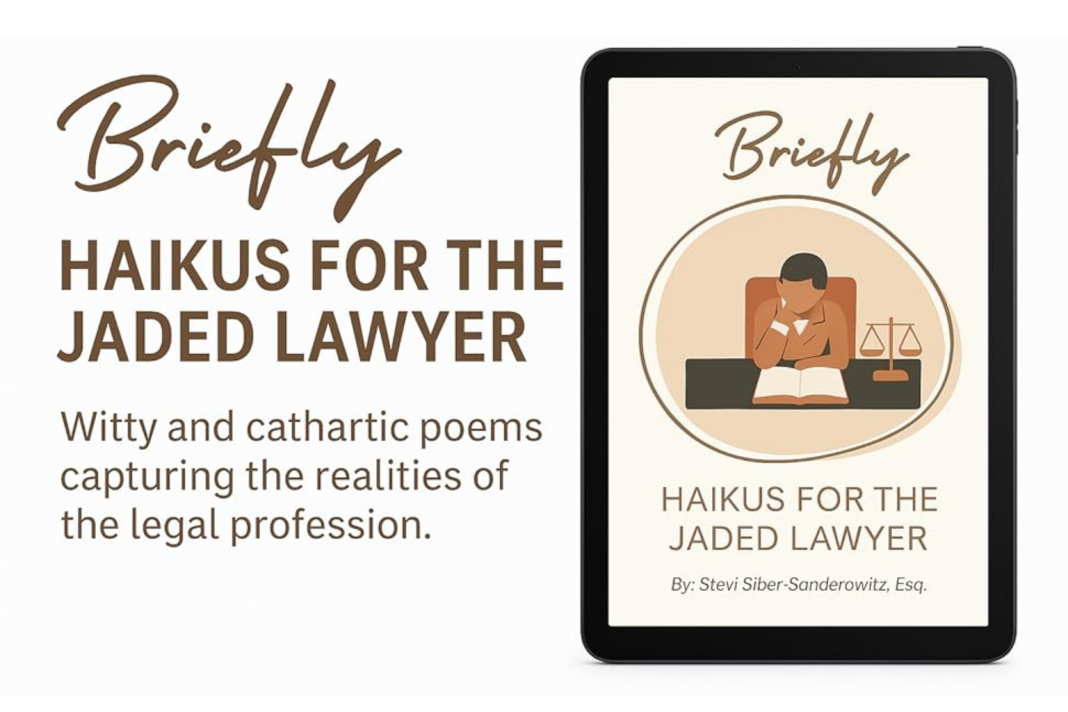Stevi Siber-Sanderowitz is an attorney with over a decade of experience spanning private practice and in-house counsel roles. She lives in New York, where she juggles legal work, parenting and strong opinions about the Oxford comma.

Her latest book, “Briefly: Haikus for the Jaded Lawyer,” is a witty, relatable collection of haiku, tackling the less glamorous sides of legal life: from law school and the bar exam to billable hours, clients and the joys of office politics. It is a perfect read for law students, grads and practicing attorneys who need a laugh.
Excerpt from the book
Legal writing class.
Wrote with my soul. Got a
“Meh.” That tracks, I guess.
The idea for this book started when my son came home from school and told me he was learning how to write haikus. I vaguely remembered something about syllables and nature from my own childhood, but I asked him to remind me. Five syllables, then seven, then five.
Simple enough, until you actually try to say something that way. We sat together, brainstorming ideas for his homework. He wrote about dogs. I wrote one about a looming work deadline. Somewhere between line two and dinnertime, I realized this form might be the only poetic structure lawyers would tolerate.
A haiku is a three-line poem with a syllable structure of 5-7-5. That’s the traditional format, though many modern haikus take some liberties. The form originated in Japan in the 1600s as the opening verse of a longer collaborative poem called a renga. These opening stanzas, known as hokku, eventually became standalone poems, and the form we now call haiku was born. Matsuo Bashō, one of the most famous haiku poets, used the structure to capture the natural world in precise, fleeting images. The spirit of haiku is clarity, compression, and attention to detail. All things lawyers are supposedly trained to value, though we rarely apply them to our own writing.
This book takes the structure of haiku and turns it toward the legal profession. These poems are not profound. They are not about cherry blossoms or mountaintops. They are about billable hours, client emails, broken coffee machines, and the quiet rage of redlining a contract for the seventh time. They are sharp, short, and hopefully familiar to anyone who’s ever survived a deposition or an internal all-hands.
Each haiku stands on its own. There’s no need to rush. Read one, pause, move on. Some will sting, some will land flat, and a few may resonate with you. That’s part of the form. Law rarely makes space for silence or brevity, but haiku does.
This is a book of short poems for people used to long documents. If you’ve read this far, you probably needed the break.
This book is organized by theme. Each chapter focuses on a part of legal life that tends to leave a mark: law school, the bar exam, billable hours, workplace sexism, litigation, clients, in-house life, emails, parenting as a lawyer and exit strategies. These are not comprehensive takes, they are snapshots.
The haikus are not arranged chronologically or by severity. You might bounce from sarcasm to sincerity, annoyance to exhaustion, all in a few pages. This is intentional. Law isn’t linear, and neither is the experience of practicing it.
Each haiku follows the traditional three-line structure. Some stick to the 5-7-5 syllable count, others stretch a bit. The goal was not technical perfection. It was honesty.
You don’t need to read this cover to cover. Pick a chapter, read a few lines, close the book. It’s meant to fit into the cracks of your day, not compete with your inbox. If it makes you pause, laugh, or feel seen for a second, it has done its job.
Available in hardcover, paperback and Kindle on Amazon.

